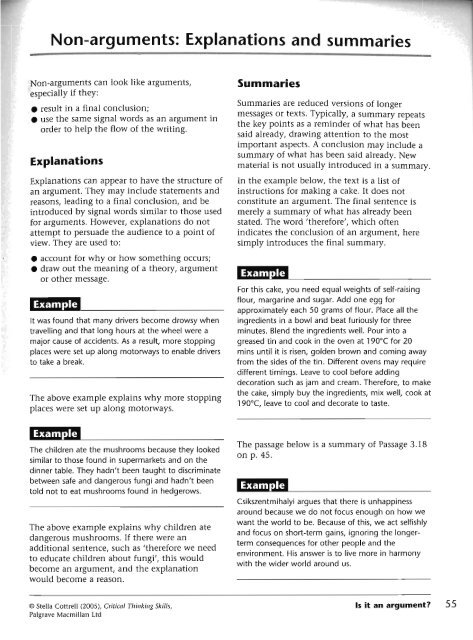Critical Thinking Skills - Developing Effective Analysis and Argument(2)
Critical Thinking Skills - Developing Effective Analysis and Argument(2)
Critical Thinking Skills - Developing Effective Analysis and Argument(2)
Create successful ePaper yourself
Turn your PDF publications into a flip-book with our unique Google optimized e-Paper software.
Non-arguments: Explanations <strong>and</strong> summaries<br />
on-arguments can look like arguments,<br />
,pecially if they:<br />
r result in a final conclusion;<br />
use the same signal words as an argument in<br />
order to help the flow of the writing.<br />
Explanations<br />
Explanations can appear to have the structure of<br />
an argument. They may include statements <strong>and</strong><br />
reasons, leading to a final conclusion, <strong>and</strong> be<br />
introduced by signal words similar to those used<br />
for arguments. However, explanations do not<br />
attempt to persuade the audience to a point of<br />
view. They are used to:<br />
account for why or how something occurs;<br />
draw out the meaning of a theory, argument<br />
or other message.<br />
Summaries<br />
Summaries are reduced versions of longer<br />
messages or texts. Typically, a summary repeats<br />
the key as a reminder of what has been<br />
said already, drawing attention to the most<br />
important aspects. Aconclusion may include a<br />
summary of what has been said already. New<br />
material is not usually introduced in a summary.<br />
In the example below, the text is a list of<br />
instructions for making a cake. It does not<br />
constitute an argument. The final sentence is<br />
merely a summary of what has already been<br />
stated. The word 'therefore', which often<br />
indicates the conclusion of an argument, here<br />
simply introduces the final summary.<br />
For this cake, you need equal weights of self-raising<br />
flour, margarine <strong>and</strong> sugar. Add one egg for<br />
approximately each 50 grams of flour. Place all the<br />
ingredients in a bowl <strong>and</strong> beat furiously for three<br />
minutes. Blend the ingredients well. Pour into a<br />
It was found that many drivers become drowsy when<br />
travelling <strong>and</strong> that long hours at the wheel were a<br />
major cause of accidents. As a result, more stopping greased tin <strong>and</strong> cook in the oven at 190°C for 20<br />
places were set up along motorways to enable drivers mins until it is risen, golden brown <strong>and</strong> coming away<br />
to take a break.<br />
from the sides of the tin. Different ovens may require<br />
different timings. Leave to cool before adding<br />
decoration such as jam <strong>and</strong> cream. Therefore, to make<br />
the cake, simply buy the ingredients, mix well, cook at<br />
The above example explains why more stopping<br />
places were set up along motorways.<br />
1 90°C, leave to cool <strong>and</strong> decorate to taste.<br />
The children ate the mushrooms because they looked<br />
similar to those found in supermarkets <strong>and</strong> on the<br />
dinner table. They hadn't been taught to discriminate<br />
between safe <strong>and</strong> dangerous fungi <strong>and</strong> hadn't been<br />
told not to eat mushrooms found in hedgerows.<br />
The above example explains why children ate<br />
dangerous mushrooms. If there were an<br />
additional sentence, such as 'therefore we need<br />
to educate children about fungi', this would<br />
become an argument, <strong>and</strong> the explanation<br />
would become a reason.<br />
O Stella Cottrell (2005), Crih'crri <strong>Thinking</strong> <strong>Skills</strong>,<br />
Palgrave Macmillan Ltd<br />
The passage below is a summary of Passage 3.18<br />
on p. 45.<br />
Csikszentmihalyi argues that there is unhappiness<br />
around because we do not focus enough on how we<br />
want the world to be. Because of this, we act selfishly<br />
<strong>and</strong> focus on short-term gains, ignoring the longerterm<br />
consequences for other people <strong>and</strong> the<br />
environment. His answer is to live more in harmony<br />
with the wider world around us.<br />
Is it an argument 55



